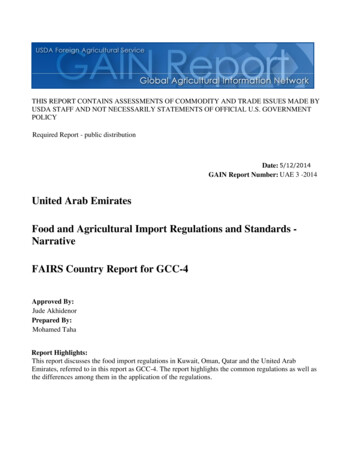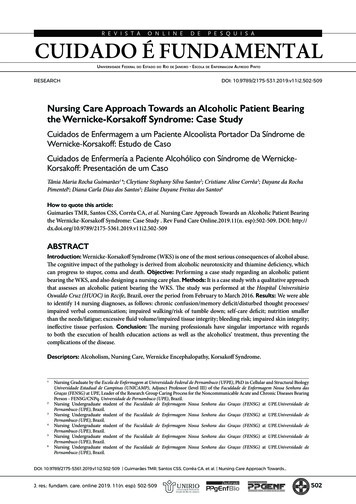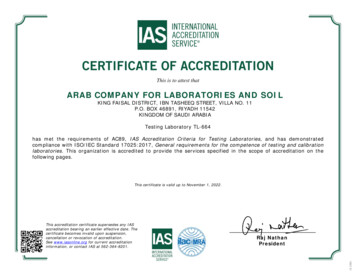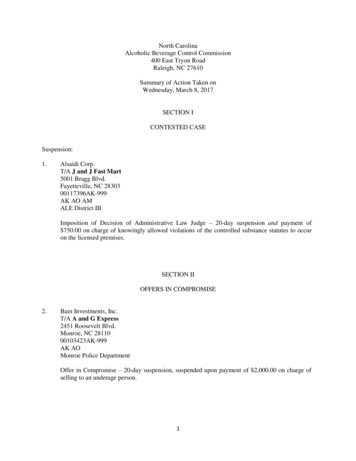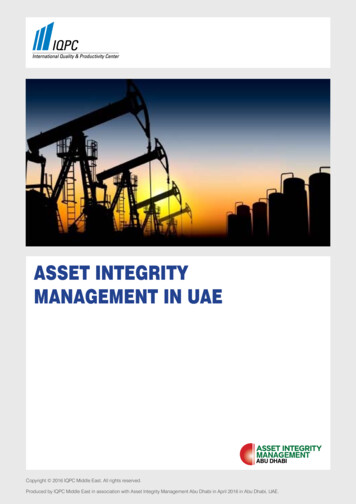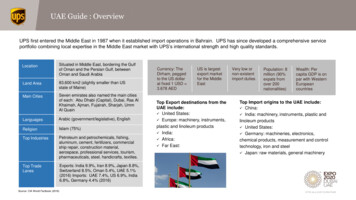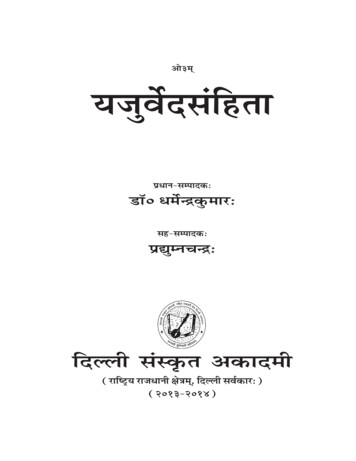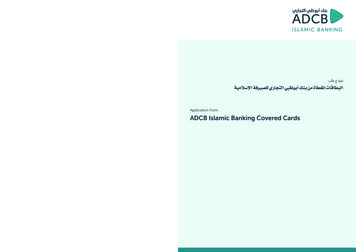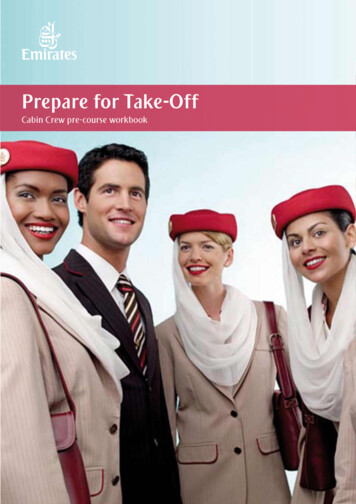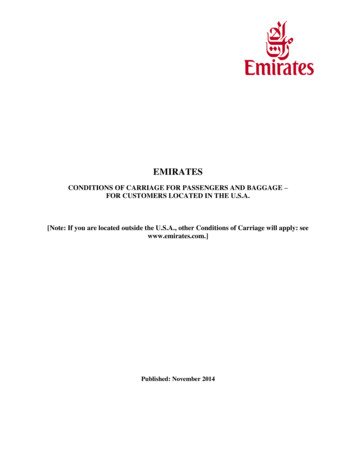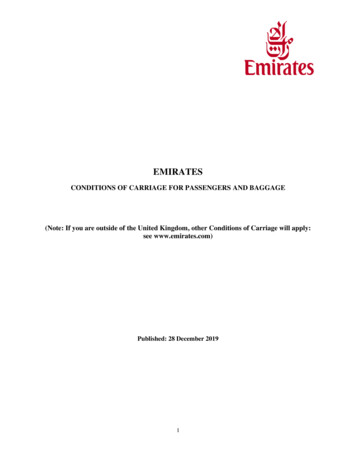
Transcription
THIS REPORT CONTAINS ASSESSMENTS OF COMMODITY AND TRADE ISSUES MADE BYUSDA STAFF AND NOT NECESSARILY STATEMENTS OF OFFICIAL U.S. GOVERNMENTPOLICYVoluntary- PublicDate: 6/14/2012GAIN Report Number: UAE/Alcohol/2012United Arab EmiratesPost: DubaiUAE Alcoholic Beverages ReportReport Categories:BeveragesApproved By:Jude AkhidenorPrepared By:Simon ManoukianReport Highlights:The UAE market for alcoholic beverages has been growing at an annual rate of 8%. In 2010the UAE imported about 107 million worth of alcoholic beverages of which 7.4 million werere exported to other countries. Imports from the United States were valued at 3 million, almost3% of the total.
General Information:IntroductionThe Islamic Sharia law observed in the United Arab Emirates prohibits the production andconsumption of alcoholic beverages for Muslims. The law is strictly applied on all Muslimresidents in the country, regardless of national origin. However, given the large number ofnon-Muslim expatriates living in the UAE, and their demand for access to alcoholic beverages,the government has made allowances for this group to purchase and consume importedalcohol, which is strictly regulated and only sold in designated locations. The bulk of theimported alcohol is traded through the major emirates of Abu Dhabi ( 14.6 million), Dubai( 89.1 million), and Sharjah ( 3.5 million).Customs TariffsMost imported food products in UAE are subject to 5% customs duty, except for staple goodsand fresh produce which are exempt from duty. The duty on alcoholic beverages is 30%. Anadditional sales tax of 50% is levied on all alcoholic beverages sold in Dubai.LegislationThe sale of spirits is permitted in dedicated retail stores and licensed outlets such asrestaurants, bars and night clubs that are either part of a hotel or selected sports clubs. Standalone retail outlets like grocery stores, supermarkets and restaurants are not authorized to sellor serve alcohol.All hotels serving alcoholic beverages in their facilities are required to have a valid liquorlicense issued by the local police authorities. Similarly, consumers are expected to have aliquor license to be able to consume alcohol legally. Although consumers are not asked toshow their liquor license before being served, it is advisable that they have it with them whiledrinking.To be able to purchase alcohol, eligible residents of UAE should have a valid liquor license.The license is an annual permit issued by the Criminal Investigation Department (CID) of thePolice Department in each Emirate. It is only issued to non-Muslim residents of UAE who areat least 21 years of age and have a monthly income of at least Dhs.3,000 (US 815).The license is valid in the issuing Emirate only and entitles the holder to buy, consume andtransport alcohol throughout the seven Emirates. The license sets the maximum monthlyamount the holder is entitled to buy based on his/her monthly salary. The law prohibits theholder of a license to sell alcoholic beverages to a third party. Any criminal offense resultingfrom the influence of alcohol is severely punished by law.
Violations and PenaltiesThe consumption of alcoholic beverages in public is strictly prohibited in the UAE. Muslimoffenders are punished as per the Islamic Shariah law. Expatriates are penalized by paying afine, confiscation of their driving license, serving jail term, and possibly deportation to theirhome country.There is zero tolerance towards driving under the influence of alcohol. To help avoid the strictpenalties, consumers under the influence of alcohol are advised to take a taxi home or use theservices provided by organizations such as Safer Driver in UAE (www.saferdriver.ae), whichsends a chauffeur to drive the client home in his/her own vehicle.Of all the seven Emirates, trade and consumption of alcohol in Sharjah is strictly forbidden.Sharjah is considered a ‘dry emirate’, with the exception of Sharjah Wanderers Sports Clubwhich is the only place in the Emirate in which alcohol is allowed. The only retailer of alcoholicbeverages in Sharjah is the Duty Free store at Sharjah International Airport. Although Sharjahis considered a dry Emirate, it is legal for holders of a liquor license from other Emirates tobring alcohol into Sharjah for personal use.Market Segments and Distribution ChannelsAlcoholic beverages trade in UAE can be divided into three broad segments:1. On-Trade and Off-Trade channels2. Duty Free and Dubai Ports3. Re-Export to other countriesThe terms on-trade and off-trade usually refer to sales of any product that requires licensing,which includes alcoholic beverages. In the United States the terms ‘on-premise’ and ‘offpremise’ are more commonly used, whereas in UK ‘on-license’ or ‘off-license’ is commonlyused. In all cases, ‘on-trade’ is used to refer to consumption on the premises where alcohol isbought (hotels, bars, restaurants, night clubs) and ‘off-trade’ for consumption off/or away fromthe premises (retail stores).Almost 75% of alcoholic beverages traded in UAE are sourced through on-trade and 25%through off-trade channels. With a total of 137 four and five star hotels, Dubai alone has morethan 1200 on-trade outlets such as restaurants, pubs and night clubs.Duty free stores at the UAE ports form the second largest segment of alcohol trade in the UAEgiven the large number of passengers visiting the country every year. Passenger traffic inDubai Airports reached a historic 51 million in 2011, coinciding with the airport’s 51st year ofoperations. Abu Dhabi Airports reported a record 12.4 million of passengers in 2011, whereasSharjah Airport received 6.6 million passengers.In 2011 more than 11 million guests stayed in hotels in the UAE, with Dubai hosting more than80% of the total in its 371 hotels. Ongoing expansion projects in the UAE airports and theconstruction of new hotels reflect the anticipated growth in the number of visitors expected inthe near future, which is likely to result in a surge in consumption and sale of alcoholic
beverages.Trade data released by the customs authority in each emirate indicate that the value of reexported of alcoholic products reached almost US 7.4 million in 2010, about 7% of totalimports. The top 10 re-export countries by value of exports are shown below.2010 UAE RE-EXPORT BY VALUECountrySAUDI ARABIASULTANATE OF OMANSRI LANKAGERMANYUK (UNITED KINGDOM)AUSTRALIASOUTH AFRICAITALYLEBANONIRAQValue ( USD 74312,790203,479200,073Weight ( Kg 211,353152,709Major DistributorsIn the UAE, the number of importers and distributers of alcoholic beverages is restricted to aselect few. Two major distributors in Dubai: African and Eastern (a e) and Maritime &Mercantile International (MMI). MMI is a subsidiary of the Emirates Group holding around 57%of the market share whereas African & Eastern (40% owned by SAB Miller), has 43% of themarket share.African and Eastern operates 24 retail stores in the UAE (16 in Dubai and 8 in Abu Dhabi), andMaritime & Mercantile International (MMI) operates 13 stores located in Dubai and theNorthern Emirates. Both companies are licensed to stock, distribute, and retail alcohol inapproved locations all over UAE through their warehousing facilities and network of retailstores.A third distributor in Dubai is Coastal Communities Distribution (CCD) owned by the Dubaibased Nakheel Company, which is licensed to distribute exclusively to the coastalcommunities of the Palm Jumeirah and The World projects. The Palm Jumeirah is a manmade island resort in the form of a palm tree with about 50 restaurants, 4 five star hotels and13 beach clubs, all with permits to serve alcohol to their clients. The World project, still in itsdevelopment stage, is a collection of artificial islands in the form of the world, located off thecoast of Dubai.In Abu Dhabi, the Abu Dhabi National Hotels (ADNH), a leading hospitality group, is one of themajor distributors of alcoholic beverages in some five star hotels. ADNH is a joint venturecompany with the UK based Compass Group, one of the largest catering companies in theworld. Two other major distributors in Abu Dhabi are African Eastern and Gray MacKenzie &Partners, the liquor arm of Abu Dhabi Maritime and Mercantile International (ADMMI).
A number of other companies based in Dubai and the Northern Emirates supply to the UAEmarket. One retailer based in the Northern Emirate of Umm Al Quwain (UAQ) operates a retailstore with an annual turnover which almost equals the total sales of one of the majordistributors in Dubai. Its success is due to the 50% sales tax applied on retail stores in Dubaiwhich is non-existent in the Northern Emirates.Advertising and Promotional ActivitiesGiven religious sensitivities, openly advertising alcoholic beverages in newspapers and massmedia is prohibited. Showing product names, brands and pictures of alcoholic beverages arenot allowed in the UAE. Advertisements and promotions are carried out in closed doors at thepoint of sale, through on-trade and off-trade channels. Even window displays in licensed retailstores are not allowed. Any offense in this regard is considered a violation resulting inrevocation of the liquor license. The same applies if the retailer sells alcoholic beverages toclients not holding a license.Liquor companies may hold events such as sampling and in-store weekly promotions onselected products. Flyers, magazines, banners and other printed media are distributed duringthese various promotional events. Liquor catalogues including discount vouchers aredistributed free of charge at authorized retail stores. Similar promotional activities are carriedout through on-trade channels in pubs, bars, restaurants, and night clubs that are part of ahotel or sports club.Market Size and Direct Trade DataIn the absence of unified trade data base in the UAE, figures shown in the tables below werecompiled from the Customs Authorities of the three largest Emirates of Abu Dhabi, Dubai andSharjah where most of the trades take place.About 107 million worth of alcoholic beverages were imported in 2010 of which 7.4 millionwere re-exported to neighboring countries.UAE ALCOHOL TRADE IN 2010 (IN USD)*HS.DescriptionCode22 0322 0422 0522 06Beer made from maltSparkling wine, Wine of fresh grapes &grape must with fermentationprevented or arrested by the additionof alcohol, in containers holding 2liters or less.Vermouth and other wine of freshgrapes flavored with plants oraromatic substances in containersholding 2L or lessOther fermented beverages (ex. cider,perry, mead); mixtures of 837770711,046728,897166,22013,736
220722 08beverages & non-alcoholic beveragesUndenatured ethyl alcohol of strengthby volume of 80% or higher, includingconcentrates of alcoholic beverages;Denatured Ethyl Alcohol and otherspirits of any strengthSpirits obtained by distilling grapewine or grape marc, Whisky, Rum andother spirits obtained by distillingfermented sugar-cane products, Gin &Geneva, Vodka, Liqueurs & Cordials,Spirits & spirituous 61620,046,7573,460,6001,919,793606,704 107,156,91253,893,530 7,374,5402,661,497The total value of imported alcoholic beverages from the United States in 2010 reached 3million, about 3% of all imports. Wine makes up almost 45% of the total alcoholic beverageimports from the U.S. and beer about 35%. Not all the wineries in the United States are awarethat some of their brands are available in the UAE market, the reason being that someproducts are usually brought in by third party companies who consolidate shipments fromdifferent wine distributors in the United States. This situation is similar to U.S. foodmanufacturers that rely on exporting companies to sell their products in foreign markets.The following alcoholic beverages are some of the U.S. brands available in the UAE market.Wine: 14 Hands, Andrew Quady, Benziger, Beringer,Blossom Hill, Bonny Doon, Cakebread,Chateau Ste. Michelle, Columbia Crest, Conn Creek, Cooks, Domaine Drouhin, DuckhornVineyards, E&J Gallo Winery, Erath, Esser, Fetzer, Frog’s Leap, Grgich Hills Estate, HartfordCourt, Hawk Crest, Heitz Cellars, Highland Estate, Joseph Phelps, Kendall Jackson, MatanzasCreek, Northstar, Oakville, Paul Masson, Ravenswood, Ridge, Robert Mondavi, Saintsbury,Seghesio, Smoking Loon, Stag’s Leap Wine Cellars, Stonehedge, Swanson Winery,Yountville.Beer: Budweiser, MillerWhiskey & Bourbon: Ancient Age 10 Star, Baker’s Bourbon, Basil Hayden’s Bourbon,Bernheim Wheat Whiskey, Booker’s Bourbon, Buffalo Trace, Bulleit, Early Times, Elijah Craig,Evan Williams, Fighting Cock, Georgia Moon Corn Whiskey, Jack Daniel’s, Jim BeamBourbon, Knob Creek Bourbon Whisky, Maker’s Mark, Mellow Corn Whiskey, Pappy VanWinkle, Parker’s Heritage Collection, Rittenhouse, Wild Turkey Rye, Woodford Reserve, OldPremium Bourbon.Other Spirits: Gilbey’s Gin.USA – UAE Direct trade data:2010 USA - UAE DIRECT TRADE TOTAL*H.S.CodeDescriptionTOTAL IMPORTValue(USD)Weight(Kg)TOTAL RE-EXPORTValue(USD)Weight(Kg)
22 0322 04220722 08Beer made from maltWines of fresh grapes, including fortifiedwines, sparkling wines, Grape Must,Vermouth & othersUndenatured ethyl alcohol of strength byvolume of 80% or higher, Denatured EthylAlcohol and other spirits of any strengthSpirits & spirituous beverages, Whiskies,Rum, Gin & Geneva, Vodka, Liqueurs 410,794203,527102,49400871,893133,80700 3,029,684979,068 73,50410,7940BEER: UAE IMPORT BY VALUE (2010)HS Code 2203: Alcoholic beer made from maltCountryValue (USD) Weight (Kg)NETHERLANDSUSAUK (UNITED 6
14.06.2012 · is considered a dry Emirate, it is legal for holders of a liquor license from other Emirates to bring alcohol into Sharjah for personal use. Market Segments and Distribution Channels Alcoholic beverages trade in UAE can be divided into three broad segments: 1. On -Trade and Off Trade channels 2. Duty Free and Dubai Ports 3. Re-Export to other countries
